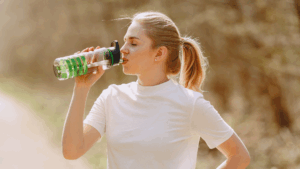
The Truth About Hydration
Introduction: More Than Just Drinking Water
You’ve probably heard it a hundred times: “Drink more water.” But hydration isn’t just about sipping eight glasses a day. At Sri Madhavananda Specialities Hospital, we see how both overhydration and dehydration can impact your health in serious ways. So let’s break down what hydration really means, why it matters, and how to do it right.
Why Hydration Matters
Water makes up about 60% of the human body. It cushions your joints, regulates body temperature, supports digestion, and helps every cell function. When you’re properly hydrated, you feel more energetic, focused, and even happier.
Dehydration: The Silent Health Wrecker
Many people walk around in a mild state of dehydration without even knowing it. Symptoms like fatigue, headaches, dizziness, dry skin, and constipation can all point to insufficient fluid intake. In extreme cases, dehydration can lead to kidney damage, heatstroke, and hospitalization.
Signs You’re Not Drinking Enough Water
-
Constant thirst
-
Dark yellow urine
-
Dry mouth and lips
-
Muscle cramps
-
Brain fog or trouble concentrating
Sound familiar? You’re probably not drinking enough fluids—or losing more than you think.
Is There Such a Thing as Too Much Water?
Yes! It’s called hyponatremia, or water intoxication. This occurs when you consume so much water that it dilutes the sodium in your blood. This can lead to swelling in your cells and, in severe cases, become life-threatening. Balance is key.
How Much Water Do You Really Need?
Forget the one-size-fits-all “8 glasses a day” rule. Your hydration needs depend on:
-
Age and weight
-
Physical activity levels
-
Climate and temperature
-
Diet (salty and high-protein foods require more water)
-
Health conditions (like diabetes or kidney disease)
A good rule of thumb? Drink enough so that your urine is light yellow—not dark, and not totally clear.
Hydration Isn’t Just About Water
Surprise! You don’t have to drink plain water all day to stay hydrated.
Other Sources of Hydration:
-
Fruits like watermelon, oranges, strawberries, and cucumbers
-
Vegetables like lettuce, zucchini, and celery
-
Herbal teas and broths
-
Coconut water (natural electrolyte-rich choice)
Even foods like yogurt and soup can contribute to your daily fluid intake.
Do Caffeine and Alcohol Dehydrate You?
Contrary to popular belief, moderate caffeine intake (like a morning cup of coffee or tea) doesn’t significantly dehydrate you. But alcohol? That’s a different story. Alcohol acts as a diuretic, increasing fluid loss and making hangovers worse. If you drink, balance it with water before and after.
The Role of Electrolytes in Hydration
Water isn’t the only player—electrolytes like sodium, potassium, magnesium, and calcium help regulate fluid balance in and out of cells. This is especially important after heavy sweating, illness, or intense exercise.
Sports drinks can help, but many contain added sugar. Consider healthier alternatives like electrolyte tablets or natural sources like bananas and coconut water.
Hydration and Special Populations
Children
Kids are more vulnerable to dehydration, especially in hot weather or during play. Encourage water breaks and hydrating snacks like fruits.
Elderly
As we age, our sense of thirst weakens. Older adults may not feel thirsty even when they need water. That’s why caregivers should ensure regular fluid intake.
Patients with Medical Conditions
Conditions like kidney disease, heart failure, or those requiring diuretics may require strict fluid monitoring. Always follow your doctor’s hydration guidance.
Hydration Tips You Can Use Today
-
Start your day with a glass of water
-
Carry a reusable water bottle
-
Set reminders to sip water regularly
-
Add natural flavor (like lemon, mint, or berries) to make water more appealing
-
Eat water-rich foods
-
Monitor your urine color
Conclusion: Hydration Is Health
Hydration isn’t a health trend—it’s a daily necessity. Whether you’re active, recovering from illness, or just trying to feel your best, proper hydration supports your body’s vital functions. At Sri Madhavananda Specialities Hospital, we encourage you to take hydration seriously—because even small changes can lead to big improvements in your health.
FAQs
1. Can I hydrate with juice or soda?
Juices can hydrate but often contain high sugar. Soda may quench thirst but adds empty calories and can dehydrate over time. Stick to water and low-sugar drinks.
2. Is cold water better than warm water?
Temperature doesn’t affect hydration, but cold water may be more refreshing after workouts. Choose what helps you drink more comfortably.
3. How does hydration affect skin?
Hydrated skin looks plumper, clearer, and more elastic. Dehydration can make your skin appear dull and flaky.
4. Can I drink too much water in one sitting?
Yes—chugging large amounts can overwhelm your kidneys and dilute sodium levels. Sip water steadily throughout the day.
5. What’s the best time to drink water?
Begin your day with water, hydrate before meals, and drink more during hot weather or exercise. Avoid large amounts right before bed to prevent sleep disruptions.
